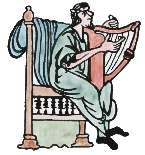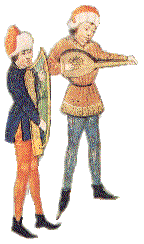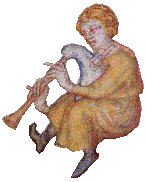 |
 |
||||||
 |
 |
||||||
| March of the King of Laoise | Ruairí Óg Ó Mórdha or "Rory of the hills", for whom the tune was probably composed, was a 16th century head of the O'Moore family. |
| Brian Boru's March | Máirseáil Bhriain Borumha. A well-known old clan march, but probably not so ancient as the King of Munster, who died at the battle of Clontarf, in 1014. |
| Argan Mór | Presented by Bunting as an "Ossianic air", collected on the shores of Antrim (the crossing point towards MacPherson's country), in Murlough, not far from the so called Ossian grave. |
| Bundle of rushes | Beartán luachrach - From the second (1809) Bunting collection. |
| Castle O'Neill | Caisleán uí Niall. |
| The Lamentation of Deirdre for the Sons of Usnach |
An air sung to the famous story of Deirdre, as found in the Book of Leinster, exile and death between Erin and Alba... One of the first aisling song ? (Bunting's version is followed by Petrie's). Please read here Bunting's comprehensive comments about this piece. |
| Feaghan Gleash | Féachain gléas or "try it if it be in tune" - Played as part of an old harp prelude by Hempson, elder of the harpers who attended the famous Belfast gathering in 1792, and the only one who used the traditional finger nail technique. |
| The Forlorn Queen | Ríon an Uaigneach. |
| Maguire's Lamentation | Caoineadh Mhic Uidhir - Collected by Bunting from the playing of Catherine Martin, in 1796. |
| The Merchant's Daughter |
An ceannaí súgach or The jolly merchant. |
| I am asleep, and don't awake me | 'Past one o'clock' or Tá mé 'mo chlodladh 'sna dúistear mé - Once transcribed as : "Tommy McCullough made boots and shoes for me" ! |
| The Summer is coming | Ta ar Samhradh Teacht - Probably sung on the solstice feasts. |
The Parting of the Friends |
Scaradh fuinidh na gCompánach - Bunting says : 'it is often played by harpers when the audience are about to depart, and it is a popular opinion that it was composed while the Irish groaned under the opression of the Danes, and were forced to conceal themselves in caverns and sequestred places' Gráinne Yeats identifies it with Carolan's "Lament for Charles MacCabe". |
| That is the road she went | Siúd e siar an ród. |
| Sunday Morning | Maidin Domhnaigh. |
| Have you seen my Valentine | An bhfaca tú mo Bhalantine ? |
| If to a Foreign Clime you go | Úd coigríoch ma bhí tú - Collected by Bunting from an old singer in Mayo |
| The yellow Bittern | Bunnán buígh. |
| A little hour before day | Uair bheag roimh lá - With a final eastward deviation... |
| The Harvest Morn | Maidin fómhar. |
| Uileacán Dubh O ! | O! my black sorrow, (or Sleep on my Kathleen dear), from Joseph Cooper Walker's version, in his Historical memoirs of the Irish bards (1786). |
| Sloane's lamentation | Caoineadh Sloin - simply named after the gentleman from whom it was collected. |
| Joice's Tune | Spéic Seóigheach, from the first (1796) Bunting collection. |
| Ó Ro ! 'Ré do Bheatha a Bhaile | An ancient clan march, from the "Complete Collection of Irish Music", by George Petrie, edited in 1905 from his original manuscripts. |
| Thugamar féin a Samhradh linn | We brought the Summer with us - This tune, says Bunting, "is probably extremely ancient. It was sung by the band of Virgins that went out of Dublin to welcome the Duke of Ormond when he landed in Ireland." |
 |
|
| The Eagle's Whistle | Feadaíl an Iolair - Another old clan march, from Petrie, who found it in a ms. of Irish tunes (now lost) compiled by Patrick Carey, a piper from Cork. |
| The Ugly Tailor | Táilliúir an gráin - From the first Bunting collection. |
| Black Headed Deary | Cara ceann dílis - Already published previous to Bunting, in 1720, but in a minor key, instead of the "correct setting here adopted". |
| Banks of Claudy | Bruach an Chlaudaigh - Bunting says the bass accompaniment was taken down from the harper (H. Higgins), nearly as it is here given. |
| The Brown and White Garland | Bláth donn is bhan. A specimen of loobeen (lúibín, meaning small link), a kind of spinning or waulking song : each singer at his turn puts forward an impromptu verse, which is followed by a chorus of the whole assembly. |
| Alas ! the pain is in my heart | Óch nan uach is osna lár mo cléibh |
| The cunning young girl | An bhradóg bhréagach |
| The County Tyrone | Contae Tír Eoghain |

 |
 |
||||||
Rory Dall O'Catháin (c1570-c1650)
Blind Roger O'Keane should not be mistaken for the Rory Dall Morrison, (1660-1712 ?) of the scottish tradition, the harper of the MacLeod house in Dunvegan. Himself left Ulster quite early to Scotland, where he achieved great fame, until his death. He is said to have attended many houses of the Scottish nobility, and the court of James VI.
| Tabhair dom do lámh | Give me your hand, or Da Mihi Manum - composed in 1603, on the occasion of the reconciliation between the harper and Lady Eglinton, in Scotland. |
| The lame yellow beggar | Bacach buí na léimneadh - ".. is said to have been composed in reference to his own fallen fortunes towards the end of his career", according to Bunting. |
| The Hawk of Ballyshannon | Seabhac na hEirné - Would be originally known as "Port Atholl", somewhat varied by Carolan (as "Katherine O'More"). |
| The young man's dream | Aisling an Óigfhir - This tune from the first Bunting collection has been regarded as the original version of Danny Boy (Londonderry Aire), itself sometimes attributed to Rory Dall. |
| A Lesson for the Harp | Port Cláirseach. This is Rory Dall's Port Gordon, composed during his long stay in Scotland. |

 |
 |
||||||
Gerald O'Daly
Contemporary with Rory Dall O'Cahan. According to Bunting, he "is said to have been a man of rank and learning, and cultivated music only as an accomplishment."
| Ellen A Roon | Eibhlín a Rún - A very well known love song. According to the tradition, it was sung by the poet in honour of Eibhlín Kavanagh. Bunting transcribed this setting from Hempson's performance, as arranged by Lyons. |
John Scott
Bunting : "John and Harry Scott, two brothers, born in the county of Westmeath, both eminent composers and performers. They were particularly distinguished for their caoinans or dirge pieces."
| Scott Lamentation for Purcell, Baron of Loughmoe (1599) (harp version) |
Cumha Caoineadh an Albanaigh - Says Bunting : "This specimen probably belongs to that highly finished school of performance which so much excited the admiration of Giraldus in the twelth century". (Meanwhile, the scale of this tune, according to his theory would indicate a lesser age) Moreover, it is one of the few examples of a detailed transcription of Hempson's "old manner" in harp playing. |
Harry Scott
| The Lamentation of Youths |
Cumha an Deibhinsi - Another Caoine, composed in memory of Hussey, Baron of Galtrim, who died in 1603. |

 |
 |
||||||
The two Connellan brothers were born in Cloonmahon, county Sligo. Thomas is said to have carried in Scotland the tune "Limerick's Lamentation" (Marbhna na Luimneach, composed by Myles O'Reilly of Killinkere, Co. Cavan), presenting it as "Lochaber", of his own composition.
There is some confusion about assigning some of the following tunes to one or the other brother...
Thomas Connellan (c1640-c1700)
| The Jointure | Crá gaddigh goid mo Sláinte uaim - Probably one of the first piece to which, in the italian fashion, a jig is appended, a habit Carolan will carry on. (see on Carolan page, Lady Dillon, Mrs Bermingham, Mrs Judge, Mr O'Connor and others) |
| Lady Iveagh | Bantiarna Iveagh - "An air remarkable for its haughty and majestic style, suited most probably to the rank and character of the lady to whom it was addressed." (Bunting) |
| Molly St Georges | (Background music of the page) |
Love in Secret |
Grádh gan Fhios - As pointed out by Gráinne Yeats, Bunting contradicts himself regarding the composition of this piece. "The practitioner ... will be charmed with one of the most pleasing strains that any country has produced. it is accordingly so old that no trace could be discovered of the century in which it was produced." Yet he attributes it to Thomas Connellan in his third 1840 collection. |
| Sarah Kelly | Síola ni Ceallaigh - "Part of it is played by crossing the hands, technically called in Irish, Malart Phonche, and shows the degree of perfection to which the older harpers carried their performances." (Bunting) |
| Celia Connellon | Sile ni Choinnallan. |
| The Dawning of the Day | Fainne geal an lae - Listed among Carolan's tunes in Capt. Francis O'Neill's Music of Ireland. |
William Connellan (c1640-1720)
Molly Macalpine |
Maire nic Ailpin - According to Bunting and O'Sullivan, Carolan thought so highly of this tune that he said that he would rather have been its composer than any of his own melodies. Francis O'Neill, in his introduction to Dance Music of Ireland, stated that this tune is an older setting of the long dance "Poll ha'penny", and could also be identified with "Remember the glories of Brian the Brave". Here is Patsy Touhey's setting of "Brian the Brave", as transcribed by Pat Mitchell and Jacky Small (Na Píobairí Uilleann, 1986). |
 |
|
||
| Love's a tormenting pain | Is galar cráite an gradh. |
 |
 |
||||||
Cornelius Lyons (c1670-1740)
A contemporary with Carolan, and a friend of him. He was harper of the Earl of Antrim. Only one of his compositions, Miss Hamilton, has been preserved, but he is well known for the fine variations he wrote for a number of tunes, often purely baroque in their form, although he had no classical tuition.
| Miss Hamilton | Iníon i Hamilton - Remarkable as being the only remaining composition of Cornelius Lyons. |
| Little Molly-O | Maille Bheag O - "The undoubted original of Molly Astore." (Bunting) New sets of variations credited to Lyons have been discovered, among other harp tunes, in 1983, in the "Macleane-Clephane" manuscripts, compiled in about 1816, in the island of Mull. |
| Connor Macareavy (harp version) |
Conchobhar Mac Areibhe or Calleena bhacha su Seorse ? (Girls did you see Georges ?), as it is named in the first Bunting collection. One of the most beautiful tunes of its kind. |
| Ellen A Roone | See Gerald O'Daly |
| An Coolin | An Chúilfhionn - It seems that Lyons attributed this most famous tune to one of the Connellan brothers. This setting was noted from Hempson's playing, who had learned it, with variations, from Lyons. |
| A lovely lass to a friar came | Cailín deas chun bráthar tainic - Bunting questions the Irish origin of this tune, including it all the same in its collection on the authority of the old harpers. |
| Slieve Gallen | Sliabh na nGallan - A Derry tune, according to Bunting. A sheer baroque setting by Lyons. I've used here a "consonant" tuning, adjusted by John Sankey for his playing of the Sonatas of Scarlatti. For comparison, listen here to the same piece with an equal tempered (default MIDI setting) tuning. |
David Murphy (c1670-1746)
Born in Leinster, he seems to have acquired a great fame as a performer, and played in France before Louis XIV. He returned from there putting on airs, and became Carolan's favorite scapegoat and a detested rival.
| Lord Mayo | Tiarna Mhaigh-Eo - David Murphy is said to have come back uninvited to his patron's house after a one-year banishment, and to have composed this song in order to obtain forgiveness |
|
|
|
|
||
|
|
|
|||
|
|
|

Many tunes on this page come from the three collections by Edward Bunting,
originally published in 1796, 1809 and 1840.
"The Ancient Music of Ireland", comprising the three books,
has been reprinted by Walton's (North Frederick Street, Dublin, 1), in 1969.